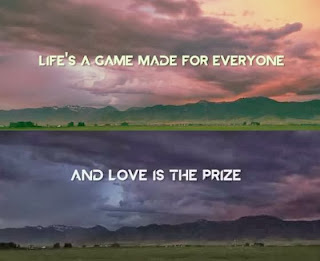"...Wow... What a great name!"
Rich and Nomi from Radio Aire were praising my name after having read the email I wrote to them. I'd spent the night editing the final part of A-Wake!
After a kip, hearing my name uttered with such consideration on the Breakfast show was a great way to wake up.
With chills running down my spine, I mustered the focus again
and carried on with the speculations about Avicii's song.
Spirituality and Success, seemingly, tie together the words in Wake.
Wake is about a challenge which is being taken on by some young person, who is warned off about potential pitfalls of endeavouring such challenge.
The young person responds to cautionary advices with irony,
which seems to be recurrent in many lines of Wake.
Irony in Wake gives me the impression that the young person possess a high level of confidence. Such confidence, I speculate, comes from the young's knowledge of some spiritual truth that's been explored in books by American authors of the 20th century.
Speculation naturally. But with every other line of Wake it's possible to feel a subtle reference to ideas similar to those from the referred works.
Here's for your consideration:
These lines remind me of Dale Carnegie's book.
Dale Carnegie is mostly known for How to Win Friends & Influence People (1936). Here, the main idea is that we can get a better response from other's behaviour toward us by altering our own behaviour toward others. It does echo the idea that events of reality somehow responds to our subconscious mind or thoughts (see A-Awake! Two).
I particularly haven't read How to Stop Worrying in depth. But skimming through it, I noticed one of its main parts: How to Keep from Worrying about Criticism. In the overall, the whole book emphasises the message that there's no good outcome on worrying and giving too much heed to stress - the weight of the world. The same idea is present in other works that deals with conquering success.
This is how the words Fear and Worry appear in Science.
"Every hour (...) you spend in giving heed to doubts and fears, every hour you spend in worry, sets a current away from you in the whole domain of intelligent Substance."
This is how Fear and Worry appear in Secret.
"...you can't expect results from the subconscious when your conscious mind is full of fear or worry..."
Napoleon Hill, in Think & Grow Rich, wrote:
"Worry is a state of mind based upon fear."
To explore the topic, Hill uses the heading Old Man Worry.
This, leads to the following lines.

Growing old is associated with increasing fear (thus worry) and loosing enthusiasm, both in Secret and Think & Grow.
Secret has a chapter entitled Why Grow Old? which says:
"Youth (...) is a mental state. You can be just as brisk, just as active, (...) as you were ten or twenty years ago."
Think doesn't explore the subject as directly but hints at it.
"...PERSISTENCE brought an astounding triumph late in life, long beyond the age when most men and women are done with ambition to achieve."
 That's a delicate topic, but the line - wish that I could stay forever this young - is explicit in Wake. It's followed by - not afraid to close my eyes; this possibly means the attitude of paying no heed to criticism, remaing enthusiastic for life, and not worrying with the gaps (and pitfalls) between one's hopes (dreams) and its full realisation.
That's a delicate topic, but the line - wish that I could stay forever this young - is explicit in Wake. It's followed by - not afraid to close my eyes; this possibly means the attitude of paying no heed to criticism, remaing enthusiastic for life, and not worrying with the gaps (and pitfalls) between one's hopes (dreams) and its full realisation.
This may justify the lines that I skipped.
Maybe they mean that paying too much attention and worrying to 'how' or the 'plans' to get there may handicap your enthusiasm to set foot on your journey to success.
Finally, before Wake repeats its ironic chorus, it states a final message.
These words remind me of the film The Matrix (1999) which centres around a game-like artificial reality where humans dwell - echoing Plato's Myth of the Cave.
In Matrix, once a person realises the nature of the game (simulated reality), he/she can be enabled to get more control over it.
The final idea in Wake perhaps is that the young person is aware that life is a virtual-like Game which he/she can play and have control by accessing his/her subconscious mind. This idea is to a great extent the gist of Science, Secret, and Think & Grow. Such idea is naturally too complex to be explored here. But they seem to be the ideas that underlie the choice of each word and lines in Wake Me Up.
Whatever is the message of in the words of Wake, it undeniably has caused a great effect on people. On Radio Aire, quite a few times, I heard it's being considered the song of the year, and it continues topping charts around the world. Also, Wake was the lead single from Avicii studio album entitled TRUE. Avicii stated that it "is about me being true to my sound and my own influences..." Now, that can lead to a whole lot of other interpretations.
Thanks for reading. Keep checking for a next post.
Meanwhile, check out: The Book







































